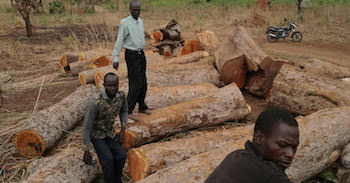Uganda’s forest sector is one area under the blink of collapse due to the outbreak of the pandemic, which is disrupting the forest law preservation enforcement system. Individuals are taking advantage of the situation by engaging in illegal forest activities that jeopardize the principal sustainable utilization of the resources.
#StayHomeSafe campaigns by the Ministry of Health to help combat the spread of the disease, have increased the use of biomass energy–which constitutes over 80% of the energy mix of Uganda–by up to 50%. This has led to high market demand, and an increase in price and production which is inevitable in this situation.
The Presidential directive on the lockdown leaves room for cargo movement including transportation of forest produce, and with the forest law enforcement system under lockdown, eventually comes unregulated use and management of the resources.
In Uganda the forest sector is one of the primary contributors to the national economy, contributing up to 6% to the GDP. Before the outbreak of the disease, the sector had a number of challenges including institutional incapacity, law enforcement issues, governance, and pressure from the local poor depending on the forest products, but these have been regulated by stakeholder partnerships and coordinated law enforcement. However, since the outbreak of the disease, the functionality of the law enforcement system has fissured.
With the Presidential directive on the lockdown giving window for agricultural activities, tree planting in Uganda has been poorly appreciated. It’s estimated to be 28 times lower compared to harvesting ratio. This is partly because most local communities prefer use of indigenous trees for fuelwood compared to promoted fast growing exotic trees.
The economic crisis in Uganda caused by President Idi Amin’s regime in the 1970s and during the war with the Lord’s Resistance Army (LRA) has had enormous adverse impacts on forest resources. A case in point in the 1970s, the institutional disruption led to collapse of the Forest Department; it took several reforms to help revive the sector.
Between 2005 to 2015 there was high percentage forest cover lost compared to any other years in Uganda’s history.
To date, the total percentage of forest cover in Uganda stands at 8% as compared to 24% in 1990. To avoid a recurrence of past scenarios of such economic crisis on forest resources, I recommend incorporation of forest law enforcement into the COVID-19 Taskforce to support integration of forest law enforcement and in addition, government should subsidize other energy costs to relieve pressure on the use of biomass.
Anywar Decimon







